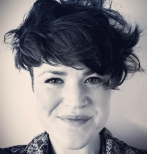Following the recent announcement of Aberdeen University’s key role in the new £15m iCAIRD artificial intelligence (AI) health research centre for Scotland, it was timely that I contributed to three public engagement events in Aberdeen across the course of 10 days in November concerning AI and health related data. As a member of Aberdeen’s Centre for Health Data Science, and as a digital health researcher and public engagement with research specialist, it was great to get out and about to talk with members of our local community about research developments at the University and with our NHS partners. It seems that this fast-moving field is of great interest to a wide audience and events were respectively promoted by the Economic and Social Research Council, British Science Association and Arts and Humanities Research Council.
On 7 November, along with Helen Keen of BBC science communication and comedy award winning fame, I ran an intensive and immersive training day for five of our postgraduate students ahead of a public performance that night showcasing their research concerning AI and consent, control and conscience, part of a series of ‘Being Human’ events. The event overran with questions from a 40+ strong audience and we enjoyed brining perspectives from multiple disciplines (including computing science, education and medicine) to the conversation, which was held in Aberdeen’s Carmelite Hotel. On 13 November, with the School’s Jonathan Pettitt (Institute of Medical Sciences), Lynne Mennie (100,000 genomes project) and the University’s Abbe Brown (School of Law, also a member of the Aberdeen Centre for Health Data Science), along with Sarah Christie (RGU), I participated in a structured ‘future debate’ on DNA and sharing it. Once again, representatives of different disciplines (genetics, ethics, law and social sciences) faced public questions dominated engagement and vibrant discussion illuminated Cognito at the Cross to compete with the outdoor streetlights of a dark and gloomy winter’s evening. Finally, on 15 November, to complement the University’s current library exhibition – of ancient Egyptian woman, Ta Kheru’s, mummified remains and personal artefacts – I spoke with Neil Curtis, Head of Museums and Special Collections, and one of the University’s industry collaborators, Andrew Sage, on the topic of immortal data at an evening event in the Belmont Cinema. We talked about Ta Kheru, Henrietta Lacks and concepts of the present day, including social media and activity tracker data many of us are generating and publishing, to facilitate exchange on ideas around immortal data, medical research and ethics.
These events all draw from and feed into teaching activities at the University. For example, I have just completed supervision of a medical humanities project for one of our School’s medical undergraduate students, Claire Thompson. She focused on AI in healthcare and has produced a report and infographic on the current state of the field and key issues to negotiate going forward. I have also guest lectured for our MSC AI programme, hosted within Computing Sciences, and look forward to co-supervising projects into 2019. In addition, I shared insights from these events with partners from Brazil who visited our Centre a couple of weeks ago as part of a GCRF joint initiative.


